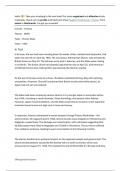Hello ! Take your studying to the next level! For more organized and effective study
materials, check out my profile and flashcard shop Maggie's Flashcards - Payhip. From
notes to flashcards, I've got you covered!
Course : History
Theme : WWII
Topic : Victory Days
Years : 1944
In Text
In Europe, the war had been winding down for weeks. Hitler, isolated and desperate, had
taken his own life on April 30, 1945. His successor, Admiral Karl Dönitz, was arrested by
British forces on May 23. The German army was in disarray, and the Allies were closing
in on Berlin. The Soviet Union had already captured the city on April 25, and American
and British forces were making their way towards the German capital.
As the war in Europe came to a close, the Allies celebrated Victory Day with rejoicing
and parties. However, Churchill cautioned that Britain could only briefly rejoice, as
Japan had not yet surrendered.
The Allies had been employing various tactics to try and get Japan to surrender before
July 1945, including a naval blockade, Tokyo bombings, and several other battles.
However, Japan remained defiant, and the Allies knew that an invasion of the Japanese
mainland would come at a high cost in lives and money.
In response, America developed a secret weapon through Project Manhattan - the
atomic bomb. On August 6 and 9, 1945, atomic bombs were dropped on Hiroshima and
Nagasaki, respectively. The damage was catastrophic, with estimates suggesting that
40,000 people were killed in Nagasaki and 70,000 in Hiroshima. The survivors suffered
from radiation sickness, leading to even more deaths in the following months.
The atomic bombs had a profound impact on the Japanese people and government. The
shock and devastation caused by the bombs led to a swift surrender, which was
announced on August 15, 1945. This marked the end of World War II in Europe and Asia.
©MargaridaVeríssimo
, The capture of Okinawa in June 1945 was a significant battle during the war in the
Pacific. It was a strategic location for launching an invasion of Japan, and its capture
allowed the Allies to prepare for the final push towards Tokyo. The battle was brutal and
bloody, with both sides suffering heavy losses.
In retrospect, the use of the atomic bombs is still debated among historians and
scholars. While it brought an end to the war quickly and saved countless lives, it also
caused immense destruction and suffering for those who survived. Regardless, V-J Day
marked a momentous occasion in world history, signaling the end of World War II and
ushering in a new era of international relations.
©MargaridaVeríssimo




